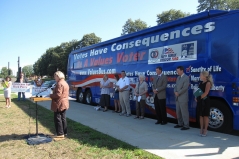Being rational and emotional are not (necessarily) contradictions
keywords:
voting, rationality, emotions, morality, political psychology
Being rational and emotional are not (necessarily) contradictions
In the first part of this three part series, my colleague Ellie Shockley described how rational thinking may drive political attitudes and voting behavior. In the second part of the series, Matt Moytl described how emotion may drive political attitudes and voting behavior. In the final part of this series, I discuss how emotions and reasons are not necessarily in conflict. / more
CEO’s, morality, and minds: How good and bad guide our perceptions of others
CEO’s, morality, and minds: How good and bad guide our perceptions of others
Morality colors the way we view the world, but how it influences our judgments of others is a controversial debate. One popular view is that morality biases people’s perceptions of others—specifically others’ intentions. I suggest that this view is incorrect. Instead, valence, not morality, guides perception , and it does so in a way that may be adaptive . / more
Political convictions emerge from the gut
keywords:
political psychology, voting, rationality
Political convictions emerge from the gut
In the first part of this three part series, my colleague Ellie Shockley described how rational thinking may drive political attitudes and voting behavior. In this second part of the series, I describe how emotion may drive political attitudes and voting behavior. In the final part of this series, Mark Brandt will discuss how emotion and reason each contribute to people’s political attitudes and behaviors. / more
Fifty Shades of arousal misattribution and cognitive associations: How Christian Grey is making us believe that women find BDSM “hot”
keywords:
BDSM, Fifty Shades of Grey, sexual aggression, rape, sexual arousal
Fifty Shades of arousal misattribution and cognitive associations: How Christian Grey is making us believe that women find BDSM “hot”
Does Fifty Shades of Grey make you wonder if BDSM is arousing? If women secretly want to be spanked? This post explains how Fifty Shades readers may develop this belief, how it may affect their behavior, and how it may increase sexual aggression against women. / more
Are voters rational?

keywords:
voting, rationality, political psychology
Are voters rational?
Are voters rational? As a part of a three-part series on the subject of voter rationality, my colleagues Matt Motyl, Mark Brandt, and I will discuss some theories and research dealing with voters’ attitudes and behaviors. We hope you will stay a part of the conversation with us! / more
Everyone is prejudiced, too
keywords:
politics, prejudice, liberals, conservatives
Everyone is prejudiced, too
In this blog post, I will discuss new research in political psychology that is changing our understanding of what prejudice is, and who is prejudiced. / more
Re-thinking how we think about conformity
keywords:
cross-cultural psychology, socio-ecological approach, relational mobility, culture, pen choice, open and closed cultures
Re-thinking how we think about conformity
In this post, I recount part of my journey into the nitty-gritty of cross-cultural differences in behavior. More specifically, I discuss the link between skateboarding across the USA, attractive Japanese women in tights, and the paradoxical nuances in conformity between cultures. / more
Does parental disapproval lead to love or dissolution? The Romeo and Juliet effect vs. the social network effect
keywords:
social networks, influence, Romeo and Juliet, disapproval, defiance, destiny, romantic relationship, love, family, friendship
Does parental disapproval lead to love or dissolution? The Romeo and Juliet effect vs. the social network effect
In this post, I assert that two opposing theories about how opinions friends and family hold affect one’s romantic relationship (Romeo and Juliet effect vs. social network effect) can actually coexist. Though there is little empirical support for the Romeo and Juliet effect, current research demonstrates that this effect may exist in certain circumstances. / more
Everyone is biased
keywords:
politics, bias, psychological rigidity, liberals, conservatives, right-wing authoritarianism
Everyone is biased
My first blog post tells the story of my discovery of the conditions that reveal the political biases of liberals and conservatives. It’s also a story of coming to terms with my own biases. / more
After Trayvon: The science of protecting innocent black men
keywords:
Trayvon Martin, prejudice, stereotypes, IAT, in-group, out-group
After Trayvon: The science of protecting innocent black men
Even though the death of Trayvon Martin drew much public attention in the last year and a half, the shooting of an unarmed, innocent black male is in no way an isolated case in America. Jonathan Ferrell, a 24-year-old African-American man in Florida, was recently killed by police officers when he was looking for help after crashing his car. Roy Middleton, a 60-year-old Florida man, was crippled after the sheriff’s deputies mistook him for a car thief and shot him... / more
blog categories
- Culture (13)
- Current Events (9)
- Gender (6)
- Meaning Making (7)
- Other (2)
- Political Psychology (11)
- Race & Ethnicity (7)
- Solid Science (8)
